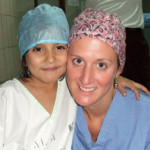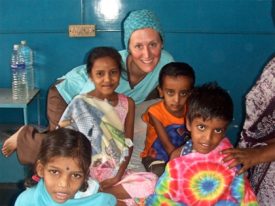From the Editor
 This month’s Student in the Spotlight is Erin Brenner, RN, a NIFA student who works in pediatric cardiology and has gone on 37 medical missions, both as a volunteer and as an employee. She is a live wire, and we are happy we were able to catch her between trips to learn about her story.
This month’s Student in the Spotlight is Erin Brenner, RN, a NIFA student who works in pediatric cardiology and has gone on 37 medical missions, both as a volunteer and as an employee. She is a live wire, and we are happy we were able to catch her between trips to learn about her story.
We also bring you a couple of news items that piqued our interest this month!
Taking a stroll after dinner is not just a pleasant way to end your day, it turns out. A new study from Stanford University Medical Center suggests that even a light walk is sufficient in reducing risk of peripheral arterial disease (PAD). This news reinforces the current recommendation of 30 minutes of moderate exercise per day for cardiovascular health.
Click here for a summary of these findings and here for an abstract of the study or to purchase the study.
Suing for a Sponge Left Behind – 20 Years Later!
Though past the statute of limitations, an Australian woman has received court permission to sue an Australian surgeon for damages caused by a grapefruit-sized surgical sponge left in her abdomen from a 1992 surgery, the Sydney Morning Herald reported earlier this month.
The sponge was not detected and removed until 2007, though the woman had suffered continued health problems since the initial surgery. The surgeon in question has stated that he always signs off the instrument count at the end of a procedure and claims to have no record of treating this patient. Click here for the full article.
Student Spotlight: Erin Brenner
 Name: Erin Brenner
Name: Erin Brenner
Credentials: RN
Student Status: Current student, RNFA program
City and State: Covington, KY
Current Positions:
OR Nurse Coordinator, International Children’s Heart Foundation (Memphis, TN); PRN at Heart Institute at Cincinnati Children’s Medical Center (Cincinnati, OH)
Path to Becoming an RNFA: My father was diagnosed with melanoma at age 35. I helped my mom out a lot during that time as we were in and out of hospitals. That experience led me to see how much impact an RN can have on a family in crisis, not only medically but emotionally. I already had an interest in science and I chose nursing because of how much my dad’s nurses meant to us. OR nursing really appealed to me–I was that kid dissecting the farm animals after they died. I decided to take the RNFA training because of my job with the International Children’s Heart Foundation (ICHF). I go on about 12 medical mission trips per year to educate surgical teams all over the world, so I really need to know what I’m doing!
Medical Mission Work: I have gone on 37 missions, both as a volunteer and an employee—Honduras, Ecuador, Ukraine, India, Morocco, Ethiopia, and the Dominican Republic. Missions with ICHF focus on building local cardiac surgical programs in established clinics and hospitals. ICHF brings in an entire team of medical volunteers–a cardiologist, an ICU doctor, an anesthesiologist, ICU nurses, etc. I’m working with a new group of 16 volunteers every two weeks. Each volunteer teaches their corresponding person in the hospital we visit, taking a staff that knows very little and teaching them basic techniques and equipment use. The majority of my role is teaching the local OR nurses.
One in 100 kids is born with a congenital heart defect, and their families have been living with these little purple kids–they are really sick. It’s almost like hitting the lottery when their child is chosen for a surgery; they are so grateful you’ve saved their child’s life. The most heartbreaking thing is that there are hundreds of kids in these countries who need help. On one trip we had a waiting room of 150 kids and we could only operate on 30. But the program works to help these hospitals become self-sufficient. In one country, Belarus, ICHF started with 45 surgeries the first year; now the hospital is doing 900 per year on their own.
We’re always looking for volunteers, professionals in adult or pediatric cardiac surgery. We are a little different than most medical mission organizations in that we pay for transportation and hotel; the volunteer has to cover the food. Interested e-News readers should contact http://www.babyheart.org. Of course, financial donations are welcome as well.
I’m also looking for medical supplies. I’m getting them from hospitals around the U.S. When a surgical pack is opened for surgery, all the unused supplies are just discarded; I’m saving them and re-sterilizing them. If any of e-News readers would like to help us out, they can contact me directly at [email protected].
 |
|
Erin with patients in Chennai, India. The children are wearing blankets made by and donated by schoolchildren in the United States. |

